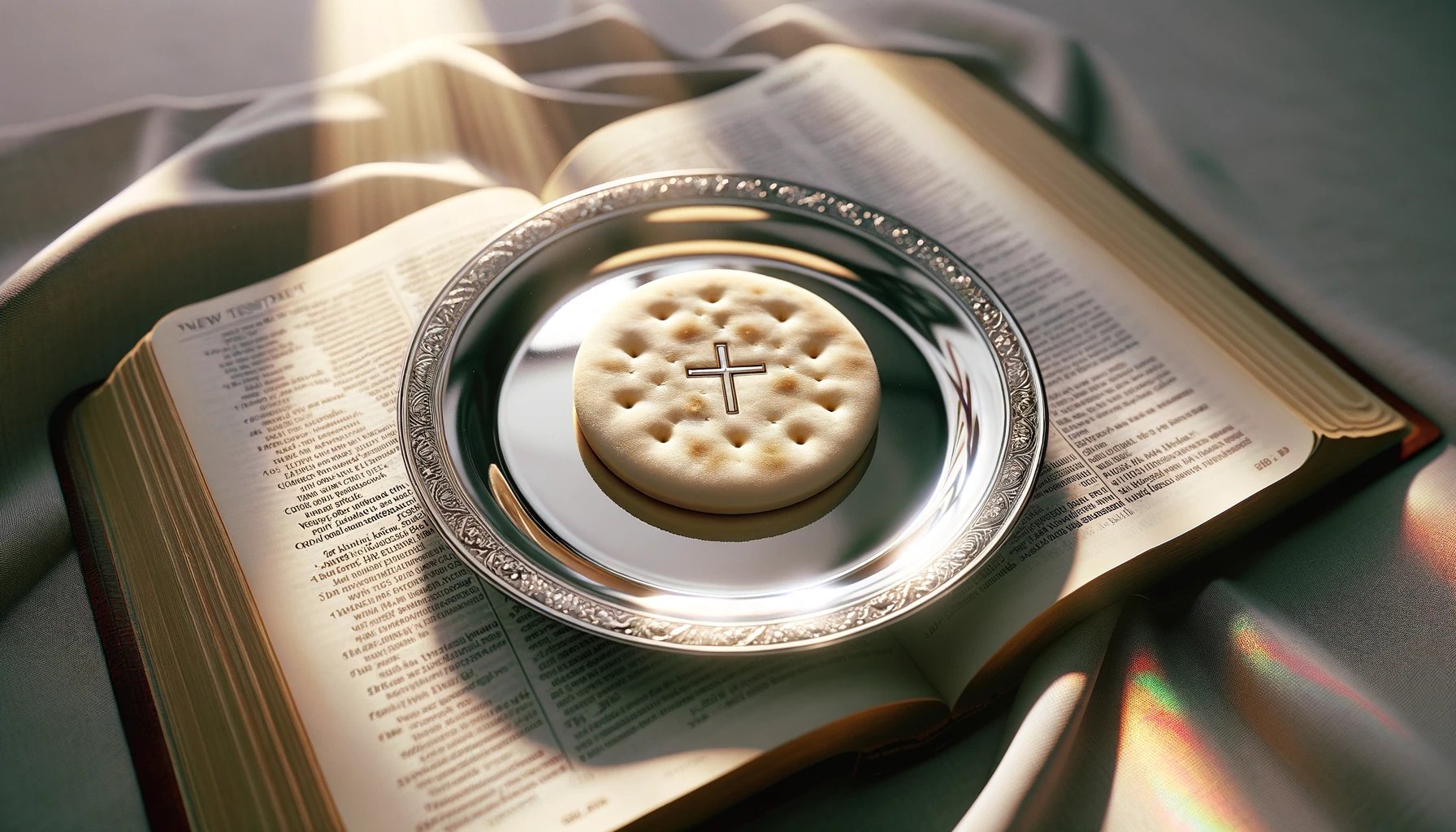Home>Theology and Spirituality>What Does The Bread And Wine Represent In Communion


Theology and Spirituality
What Does The Bread And Wine Represent In Communion
Published: February 19, 2024
Jason DeRose, Managing Editor at Christian.net, uses his expertise in religion and journalism to deepen understanding of faith's societal impacts. His editorial leadership, coupled with a strong academic background, enriches the platform’s diverse content, earning him recognition in both journalism and religious circles.
Discover the significance of bread and wine in communion from a theological and spiritual perspective. Explore the symbolism and meaning behind these elements. Gain a deeper understanding of theology and spirituality.
(Many of the links in this article redirect to a specific reviewed product. Your purchase of these products through affiliate links helps to generate commission for Christian.net, at no extra cost. Learn more)
Table of Contents
Introduction
Communion, also known as the Eucharist or the Lord's Supper, holds a central place in Christian worship and theology. It is a sacred ritual that symbolizes the core tenets of the Christian faith and serves as a profound expression of spiritual unity and remembrance. At the heart of this solemn observance are the elements of bread and wine, which carry deep symbolic significance within the Christian tradition.
The act of partaking in communion is rooted in the Last Supper, a pivotal event in the life of Jesus Christ. As described in the New Testament, Jesus shared a final meal with his disciples before his crucifixion, during which he instituted the practice of communion. He took bread, blessed it, broke it, and gave it to his disciples, saying, "Take, eat; this is my body." He then took the cup of wine, gave thanks, and offered it to his disciples, declaring, "Drink from it, all of you; for this is my blood of the covenant, which is poured out for many for the forgiveness of sins."
The profound symbolism of the bread and wine in communion is deeply intertwined with the sacrificial death and resurrection of Jesus Christ. The bread represents his body, which was broken for the salvation of humanity, while the wine symbolizes his blood, which was shed as a testament to the new covenant between God and humanity. Through the act of partaking in these elements, Christians commemorate and proclaim the redemptive work of Christ, acknowledging the spiritual nourishment and sustenance that flows from his sacrificial love.
As we delve into the rich symbolism and significance of the bread and wine in communion, we gain a deeper understanding of the profound spiritual truths they embody. The communion table becomes a sacred space where believers encounter the living presence of Christ, experience spiritual renewal, and reaffirm their commitment to the Christian faith. It is within this context that we explore the multifaceted layers of meaning encapsulated in the simple yet profound elements of bread and wine, seeking to grasp their enduring relevance in the lives of believers across the centuries.
Read more: What Does The Bread Represent In Communion
The Symbolism of Bread in Communion
The symbolism of bread in communion holds profound significance within the Christian faith, encapsulating layers of spiritual meaning and theological depth. When Jesus took the bread, blessed it, and broke it during the Last Supper, he imbued this simple element with profound symbolism that continues to resonate through the ages.
1. Nourishment and Sustenance
The bread in communion symbolizes spiritual nourishment and sustenance for the believer. Just as physical bread sustains the body, the symbolic bread of communion represents the spiritual sustenance derived from the life-giving presence of Christ. It serves as a poignant reminder of Jesus' words, "I am the bread of life. Whoever comes to me will never be hungry, and whoever believes in me will never be thirsty" (John 6:35).
2. Unity and Fellowship
In partaking of the same loaf of bread, believers symbolize their unity and fellowship as members of the body of Christ. The act of sharing from a common loaf signifies the communal bond and interconnectedness of all who partake in the spiritual blessings made possible through Christ's sacrifice. It underscores the shared identity and mutual support that characterize the Christian community.
3. Sacrificial Atonement
The broken bread represents the sacrificial atonement of Jesus Christ. His body, broken for the redemption of humanity, is vividly portrayed through the act of breaking the bread during communion. This symbolic gesture serves as a poignant reminder of Christ's selfless sacrifice and the atoning power of his death on the cross, as expressed in the words of the apostle Paul, "This is my body that is for you" (1 Corinthians 11:24).
4. Spiritual Nourishment and Renewal
Partaking of the bread in communion signifies the believer's reception of spiritual nourishment and renewal through their union with Christ. It serves as a tangible expression of dependence on Christ for sustenance and a recommitment to living in accordance with his teachings. The act of consuming the bread becomes a transformative moment, signifying the believer's participation in the life-giving presence of Christ.
5. Anticipation of the Heavenly Banquet
The bread in communion also points to the eschatological hope of believers, anticipating the heavenly banquet in the kingdom of God. It serves as a foretaste of the ultimate communion with Christ and fellow believers in the eternal kingdom, where all will partake in the fullness of God's redemptive work.
In essence, the symbolism of bread in communion encompasses themes of nourishment, unity, sacrifice, renewal, and eschatological hope, weaving together a tapestry of profound spiritual truths that continue to resonate deeply within the hearts of believers. As Christians partake of the bread in communion, they are invited to enter into a sacred encounter with the living Christ, embracing the transformative power of his sacrificial love and the promise of eternal communion in the kingdom of God.
The Symbolism of Wine in Communion
The symbolism of wine in communion holds profound significance within the Christian faith, encapsulating layers of spiritual meaning and theological depth. When Jesus took the cup of wine, gave thanks, and offered it to his disciples during the Last Supper, he imbued this simple yet profound element with rich symbolism that continues to resonate through the ages.
-
Redemption and Forgiveness
The wine in communion symbolizes the redemptive blood of Jesus Christ, which was shed for the forgiveness of sins. As Jesus declared, "This is my blood of the covenant, which is poured out for many for the forgiveness of sins" (Matthew 26:28). The deep crimson hue of the wine serves as a poignant reminder of the sacrificial love and atoning power of Christ's blood, which forms the foundation of Christian salvation. -
Covenant and New Beginnings
In partaking of the cup of wine, believers symbolize their participation in the new covenant established through the sacrificial death of Jesus Christ. The wine represents the covenantal relationship between God and humanity, signifying a new beginning and the promise of eternal life. It serves as a tangible expression of God's enduring faithfulness and the transformative power of the gospel. -
Spiritual Cleansing and Renewal
The symbolic significance of wine extends to the spiritual cleansing and renewal experienced by believers through their union with Christ. Just as wine is poured out and shared among the faithful, it symbolizes the outpouring of God's grace and the purifying work of the Holy Spirit in the lives of believers. The act of partaking in the wine signifies a renewal of faith and a cleansing of the soul through the redemptive work of Christ. -
Communal Unity and Fellowship
In sharing from the common cup of wine, believers affirm their communal unity and fellowship as members of the body of Christ. The act of partaking in the same cup signifies the shared identity and mutual participation in the spiritual blessings made possible through Christ's sacrifice. It underscores the communal bond and interconnectedness of all who partake in the redemptive grace of Christ. -
Eschatological Hope and Celebration
The wine in communion also points to the eschatological hope of believers, anticipating the joyous celebration of the heavenly banquet in the kingdom of God. It serves as a foretaste of the ultimate communion with Christ and fellow believers in the eternal kingdom, where all will partake in the fullness of God's redemptive work.
In essence, the symbolism of wine in communion encompasses themes of redemption, covenantal relationship, spiritual renewal, communal unity, and eschatological hope, weaving together a tapestry of profound spiritual truths that continue to resonate deeply within the hearts of believers. As Christians partake of the wine in communion, they are invited to enter into a sacred encounter with the living Christ, embracing the transformative power of his sacrificial love and the promise of eternal communion in the kingdom of God.
The Significance of Communion in Christianity
The significance of communion in Christianity extends far beyond a mere ritual or symbolic gesture. It embodies the profound spiritual truths and foundational principles of the Christian faith, serving as a sacred expression of unity, remembrance, and spiritual nourishment for believers across denominations and traditions.
Read more: What Does The Wine Symbolize In Communion
1. Spiritual Unity and Fellowship
Communion serves as a powerful symbol of spiritual unity and fellowship among believers. As Christians partake in the elements of bread and wine, they affirm their shared identity as members of the body of Christ. The act of coming together at the communion table transcends individual differences and denominational boundaries, fostering a deep sense of communal unity rooted in the redemptive work of Jesus Christ.
2. Remembrance and Proclamation
Through communion, Christians engage in a profound act of remembrance and proclamation. The ritual of partaking in the bread and wine serves as a tangible expression of remembering Christ's sacrificial death and resurrection. It is a solemn proclamation of faith, acknowledging the atoning power of Christ's blood and the transformative impact of his redemptive work on the lives of believers.
3. Spiritual Nourishment and Renewal
Communion holds a central place in providing spiritual nourishment and renewal for believers. As they partake in the elements, they symbolically receive the life-giving sustenance that flows from their union with Christ. The act of communion becomes a transformative moment, signifying the believer's dependence on Christ for sustenance and their commitment to living in accordance with his teachings.
4. Covenantal Relationship with God
The observance of communion signifies the covenantal relationship between God and humanity. It serves as a tangible expression of the new covenant established through the sacrificial death of Jesus Christ. Believers partake in the elements as a testament to their participation in the redemptive covenant, affirming God's enduring faithfulness and the promise of eternal life through Christ.
5. Anticipation of the Heavenly Banquet
Communion also points to the eschatological hope of believers, anticipating the joyous celebration of the heavenly banquet in the kingdom of God. It serves as a foretaste of the ultimate communion with Christ and fellow believers in the eternal kingdom, where all will partake in the fullness of God's redemptive work.
In essence, the significance of communion in Christianity encompasses themes of unity, remembrance, spiritual nourishment, covenantal relationship, and eschatological hope. It stands as a sacred observance that invites believers to enter into a profound encounter with the living Christ, embracing the transformative power of his sacrificial love and the promise of eternal communion in the kingdom of God.
Conclusion
In conclusion, the symbolism and significance of bread and wine in communion hold profound theological and spiritual implications within the Christian faith. The act of partaking in these elements transcends mere ritualistic observance, serving as a sacred expression of unity, remembrance, and spiritual nourishment for believers across denominations and traditions.
The symbolism of bread in communion embodies themes of nourishment, unity, sacrifice, renewal, and anticipation of the heavenly banquet. It symbolizes spiritual sustenance and serves as a poignant reminder of the believer's dependence on Christ for sustenance. The act of sharing from a common loaf signifies the communal bond and interconnectedness of all who partake in the spiritual blessings made possible through Christ's sacrifice. The broken bread represents the sacrificial atonement of Jesus Christ, and partaking in it signifies the believer's reception of spiritual nourishment and renewal through their union with Christ. Ultimately, the bread in communion points to the eschatological hope of believers, anticipating the heavenly banquet in the kingdom of God.
Likewise, the symbolism of wine in communion encompasses themes of redemption, covenantal relationship, spiritual renewal, communal unity, and anticipation of the heavenly banquet. It symbolizes the redemptive blood of Jesus Christ, the new covenant established through his sacrificial death, and the spiritual cleansing and renewal experienced by believers through their union with Christ. The act of sharing from the common cup signifies the communal unity and fellowship as members of the body of Christ, and it points to the eschatological hope of believers, anticipating the joyous celebration of the heavenly banquet in the kingdom of God.
The significance of communion in Christianity extends far beyond a mere ritual or symbolic gesture. It embodies the profound spiritual truths and foundational principles of the Christian faith, serving as a sacred expression of unity, remembrance, and spiritual nourishment for believers. Through communion, Christians engage in a profound act of remembrance and proclamation, providing spiritual nourishment and renewal, affirming their covenantal relationship with God, and anticipating the ultimate communion with Christ and fellow believers in the eternal kingdom.
In essence, the act of partaking in communion invites believers to enter into a profound encounter with the living Christ, embracing the transformative power of his sacrificial love and the promise of eternal communion in the kingdom of God. It stands as a sacred observance that continues to resonate deeply within the hearts of believers, uniting them in the timeless expression of faith and spiritual communion.












